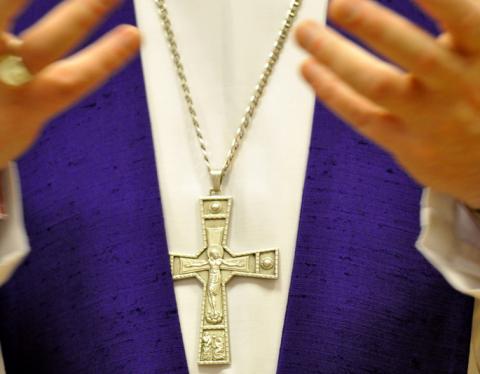The Catholic ethos and the scandal of symphysiotomy

Is there any group in Irish society more in need of moral guidance than those who purport to be the moral guardians, the Catholic bishops? By Vincent Browne.
Theresa Devoy's account of how she was subjected to symphysiotomy at the age of 18 in 1963, without her consent or knowledge, in barbarous circumstances and with awful consequences, was the most riveting interview I have conducted as a journalist.
Symphysiotomy is a surgical procedure used to increase dramatically the size of the pubic outlet to permit easier delivery of a baby - it involves the division of the pubic bone.
Devoy told how she was a tiny woman at the time, weighing just over seven stone, and about to give birth to a baby weighing ten pounds. She was brought to hospital in Kilkenny five days before the birth, went into labour two days later and remained in labour for more than two further days.
She begged to be seen by a doctor, but the nuns attending her refused, even though she was in excruciating agony.
A priest arrived and administered the last rites and, eventually, an obstetrician arrived and poked his head around the door, saying he would be back after he did his rounds and leaving her for further hours in terrible pain.
Then she awoke after the symphysiotomy procedure, to find herself bandaged tightly from her pelvis to her chest, unable to move or even see her new baby. She then suffered 49 years of depression, back pain, inability to walk properly - and incontinence during all that time.
Not until seven years ago did any medical person tell her what had been done to her, how the symphysiotomy had caused the misery that had afflicted her 49 years since.
In a High Court case recently taken by another woman, Olivia Kearney, who had been subjected to symphysiotomy, counsel on behalf of one of the defendant hospitals referred, in its defence, to the Catholic ethos that prevailed in Ireland in 1969.
He submitted that this was "espoused by a number of senior obstetricians", including some masters of the National Maternity Hospital in Holles Street, Dublin.
Judgment in the case (Kearney v McQuillan and another) was delivered by Sean Ryan, a judge of the High Court, on 23 March and he recorded the submission made on behalf of the defence: "This body of opinion [influenced by the Catholic ethos] was anti-caesarean section.
"The reason for that was apparently that a woman could only be expected to undergo a relatively limited number of operations, and it was assumed that she would probably need to have quite a few of them because it was anticipated that a woman is going to have a lot of children.
"If doctors were to perform caesarean sections more or less as required, there would come a point at which they would have to advise a woman that she should not have any more children and that would lead to the consequence that she might be tempted to use artificial contraception or she might even look for sterilisation or some other means of preventing a pregnancy.
"This consideration or these thoughts were sufficient to justify the doctors' hostility to caesarean section. This led them to be favourable to symphysiotomy, which facilitated future pregnancies as to delivery of babies."
It just seems that this Catholic ethos encouraged the practice of symphysiotomy, which ravaged the bodies of hundreds of Irish women and devastated their lives, justified by the discouragement of the abomination of artificial contraception.
Of course, the obstetricians involved had choices. It was they, not the Catholic Church, who decided to inflict this injury on women, and it was they who decided to do so without even asking the women for their consent.
There has always been something troubling about obstetricians and gynaecologists being overwhelmingly male, about men determining life choices for women and controlling women's bodies in the most intimate way.
The practice of symphysiotomy shows this at its most grotesque.
There is something troubling also about Catholic nuns being indifferent to another woman's excruciating pain in childbirth and opting to call a priest, rather than an obstetrician, to deal with the woman's distress.
It is also troubling that several of the doctors and nurses who treated Devoy for over 40 years - she was in and out of hospitals during that time - should never have asked about her medical history, never told her she had been subjected to the barbarity of symphysiotomy.
But what does it say about the Catholic Church that has been in such festive mood this past week, with rehearsed and routine acknowledgements of the hurt caused to victims of clerical child sex abuse and more pro forma apologies?
That Church is led in Ireland by a man who, interviewing two male victims of clerical child sex abuse, enquired of them whether they enjoyed the abuse (what must those boys have thought, other than that they were somehow complicit in their abuse?), then required them to take an oath of secrecy, and followed through by failing to take personal responsibility to ensure the protection of other young people who were in danger of similar abuse.
Is there any group in Irish society - lawyers, accountants, bankers, developers, politicians, medical people, journalists even, tax defaulters, social welfare fraudsters, architects, bank regulators, shopkeepers - more in need of moral guidance than those who purport to be the moral guardians, the Catholic bishops? {jathumbnailoff}
Image top: Catholic Church (England and Wales).
